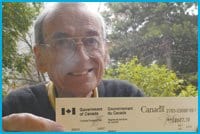This month when George Hislop opened the government envelope and saw the Canada Pension Plan (CPP) cheque inside, he first thought it was for $1,468.77. He was impressed. Then he realized it was for $14,687.70 – even better.
“I’ll just spend it when something pops up that needs doing,” says Hislop, 78. “It’s not as if I won the lottery. It’s more like accumulated enforced savings.”
Though it’s a fair chunk of change, part of which Hislop plans to spend on a gay boat cruise, the history behind the cheque is complicated. Hislop could be forced to give it back.
Hislop received the money because he’s one of about 300 same-sex widowers who are fighting the federal government over CPP payouts going back decades. Lawyers for the widowers successfully argued in two courts that they should have been eligible for survivor pension benefits since 1985, when the Charter Of Rights And Freedoms came into effect, prohibiting discrimination based on sexual orientation.
Their problem is that when the government brought queers into the plan in 2000, it only included people whose partners had died since 1998. That decision excluded Hislop, whose partner Ronnie Shearer died in 1986, and others who lost a partner in that time period. For Hislop, that’s 19 years of benefits, adding up to more than $100,000 in total.
The federal government has fought the class-action suit every step of the way, taking the issue all the way to the Supreme Court Of Canada, which has heard submissions on the case and is expected to rule early in 2006.
Of course, many of the widowers are getting up there in age and are suffering health problems, which has proved to be something of a public-relations frustration for the feds. After negotiations with Douglas Elliot, the lead lawyer in the class-action suit, the feds agreed to interim settlement payments to hold the widowers over until there’s a decision.
“The interim agreement isn’t an admission of liability or a change in the government’s position on this issue,” says Department Of Justice spokesperson Christian Girouard. Girouard says he can’t comment on why the government decided to offer the payments or whether it’s made a similar move before.
Hislop says the widowers will be required to give the money back if the Supreme Court rules against them.
“If we lose, yeah. But we don’t expect to lose,” says Hislop.


 Why you can trust Xtra
Why you can trust Xtra


